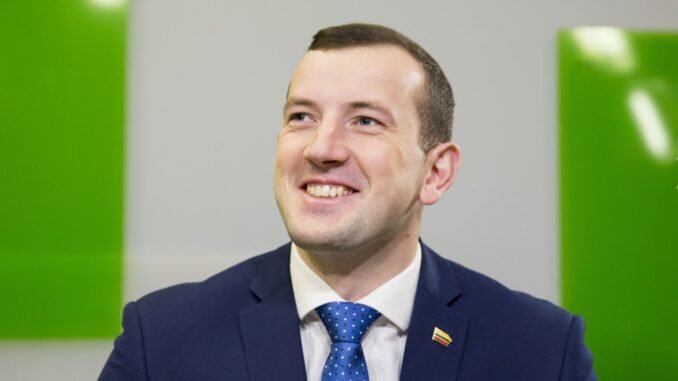
Appointed at the end of 2017 Virginijus Sinkevičius became the first Minister in the history of Lithuania born after re-establishment of Independence. He also quickly became one of the most popular ministers in the country. Impersonating the new generation of politicians of the digital age, 28-years-old V. Sinkevičius became the delegate for EU commissioner of Lithuanian ruling party.
Graduate of universities in the United Kingdom and the Netherlands, and having work experience in the United States, V. Sinkevičius turned to politics in 2016. He was elected to the Parliament of the Republic of Lithuania in a working-class Šeškinė constituency in Vilnius. Soon after that, he was elected to chair the Committee on Economics of the Parliament.
The skills of the digital native did not go unnoticed by the Prime Minister Saulius Skvernelis, who offered V. Sinkevičius to become Minister of Economy and the end of 2017.
Since then, V. Sinkevičius became the rising star of ruling Lithuanian Farmers and Greens union – a member of the Greens/EFA political group in the European Parliament. He quickly became one of the most popular Ministers in the country with global recognition. Sinkevičius was included in the list of 100 World’s Most Influential Young People in Government by Apolitical.
“We briefly discussed the candidacy in the Liberal Movement group [in the Parliament]. We highly appreciated Minister’s candidacy”, the leader of opposition Viktorija Čmilytė-Nielsen said yesterday after ruling parties announcement to propose V. Sinkevičius for EU Commissioner.
Reforming Lithuanian economy
V. Sinkevičius was able to unite all the political parties in the Parliament to support critical laws in the fields of economics and innovation. The innovation reform lead by the Minister passed the Parliament unanimously.
The reform is aimed to provide the legal basis and policy mix for cooperation between science and business. It is to ensure that the knowledge created in Lithuania is used to develop innovative products competitive in the global market. Innovation quickly became a flag of V. Sinkevičius.
Being a digital native himself, Sinkevičius took leadership in the fields of innovation, digital economy, industry digitalisation. Making it as a natural part of the global economy of XXI century V. Sinkevičius was a first Lithuania minister to emphasise that the start-up ecosystem is among top priorities of Lithuania.
The package to improve the start-up business environment prepared by the Ministry of Economy and Innovation laid down tax incentives for this type of companies. It was also crucial in simplification of procedures for foreign start-ups and foreign talents employed in start-ups operating in Lithuania. It also played an essential role in the acceleration fund and other funding instruments available for young, innovative companies. These changes have enabled a 47 % growth in the number of start-ups in Lithuania in one year.
Implementing AI strategy
Several initiatives followed this package. Lithuania is among the EU’s first countries to develop a national Artificial Intelligence (AI) strategy. It sets out the challenges and actions that will allow Lithuania to become one of the leading countries in the European Union. The law, which regulates the use of autonomous vehicles on the roads of Lithuania, has been drafted and allows the testing of autonomous vehicles under real-world driving conditions. A GovTech Lab has been established, which opens opportunities for public sector bodies to address their daily problems with the help of start-ups who will work towards new and more user-friendly solutions.
“Ambitious goals require unconventional solutions. Start-up potential could be used wisely, even coping with such a challenge like a climate change and others. Orientation towards Cleantech and Greentech could help Europe to become the first climate-neutral continent by 2050”, said V. Sinkevičius elaborating on recently established GovTech Lab.
More women in the ICT sector
According to the Minister of the Economy and Innovation, there is also a necessity to fight stereotypes and to have more women in the ICT sector.
“Talking about start-ups, innovation and technology, the most important issue faced by all the global innovation leaders, including Lithuania, is a lack of people in these fields. That’s why Lithuania came up with Women Go Tech initiative – to empower women to come to ICT, engineering and creativity. Because those women who dared to take this challenge now are very successful in their new careers”, said V. Sinkevičius in the meeting with the leading Lithuanian start-up Vinted team.
At the same time, V. Sinkevičius is known for his belief in the manufacturing industry, which creates a huge part of national GDP. To strengthen its positions globally, Industry Digitising Roadmap had been created. It is to guide the national industry to ensure that it is dominated by smart and flexible factories which manufacture higher added value products for niche markets. The factories would be capable of rapidly diversifying their activities to comply with changing market needs and having a strong presence in international value-added chains.
“I am thankful for trust showed by proposing my candidacy for EU commissioner. It’s important for me as a Minister and politician in general. But certain procedures have to be followed, hence, it’s too early to talk about it”, V. Sinkevičius said yesterday to the press.
Lithuanian Prime Minister S. Skvernelis last week announced that Lithuania is negotiating to get EU commissioner’s portfolio of energy, economics and protection of external borders.

Be the first to comment